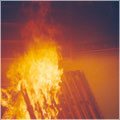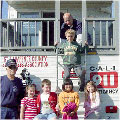|
More fires start in the kitchen than in any other part of the home. Why is the kitchen such a danger zone? Too often people fail to pay attention to what's cooking, and the consequences can be far worse than burned food. Like any home fire, cooking fires spread quickly, leaving you just minutes to escape safely. Follow these tips for safer cooking:
Stand By Your Pan
-
Most fires in the kitchen occur because cooking is left unattended. Stay in the kitchen when you are frying, grilling, or broiling food.
- If you leave the kitchen for even a short period of time, turn off the stove.
-
If you are simmering, boiling, baking or roasting food, check it regularly, remain in the home while food is cooking, and use a timer to remind you that the stove or oven is on.
No Kids Allowed
- Keep kids away from cooking areas by enforcing a "kid-free zone" of 3 feet (1 meter) around the stove.
- When young children are in the home, use the stove's back burners whenever possible, and turn pot handles back to reduce the risk that pots with hot contents will be knocked over.
- Never hold a small child while cooking.
Keep It Clean
-
Keep anything that can catch fire—pot holders, oven mitts, wooden utensils, paper or plastic bags, food packaging, towels or curtains—away from your stove top.
-
Clean up food and grease from burners and the stovetop.
- Avoid wearing loose clothing or dangling sleeves while cooking. Loose clothing can catch fire if it comes in contact with a gas flame or electric burner.
Microwave With Care
- Plug the microwave oven directly into an outlet. Never use an extension cord for a microwave as it can overload the circuit and cause a fire.
- Use only microwave-safe containers to heat food.
- Allow food to cool for a minute or more before you remove it from the microwave.
- Open microwaved containers slowly as hot steam escaping from the containers can cause painful burns. Be sure to let food and liquid cool before you eating them.
- Never use aluminum foil or metal objects in a microwave oven. They can cause a fire or burn hazard and damage the oven.
Kitchen Fires 101
While the following tips can help you put out a small kitchen fire, never forget how dangerous fire can be. If you are unable to put out the fire, get out of the home and call the fire department. When in doubt, get out!
- If you have a fire in your microwave, turn it off immediately and keep the door closed. Never open the door until the fire is completely out. Unplug the appliance if you can safely reach the outlet.
- Always keep an oven mitt and a lid nearby when you're cooking. If a small grease fire starts in a pan, smother the flames by carefully sliding the lid over the pan (make sure you are wearing the oven mitt). Turn off the burner. To keep the fire from restarting, don't remove the lid until the pan is completely cool.
- In case of an oven fire, turn off the heat and keep the door closed to prevent flames from burning you or your clothing.
- Keep a fire extinguisher in the kitchen in case of an emergency. Make sure that you know what type of fire the extinguisher will put out and how it works before an emergency occurs.
|




